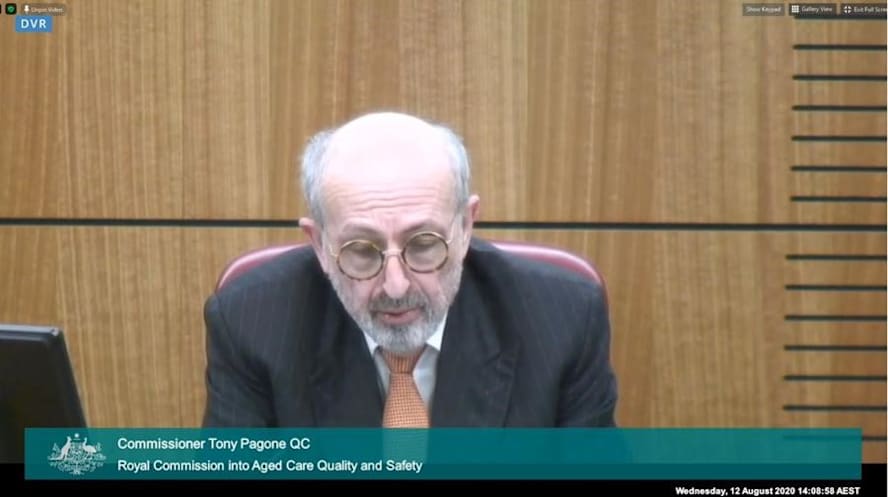The final day of the Royal Commission’s examination of the impact of COVID-19 on Australia’s aged care sector delivered on fireworks from start to finish – highlighting the issues of the Government’s stewardship of the sector, access to health care, understaffing and a regulator without ‘teeth’.
National taskforce needed – without peak bodies
Professor Joseph Ibrahim, the Head of Health Law and Ageing Research Unit in the Department of Forensic Medicine at Monash University, criticised the lack of a national coordinated taskforce response to the pandemic for the aged care sector, saying he advised the measure should have been taken six months ago.
However, he was adamant any such taskforce would need to be independent – without the involvement of the regulator or the peak bodies.
“I don’t believe the use of peak bodies in this situation is helpful or objective and I don’t believe that the [Quality and Safety] Commission has the relationships with the sector which they would trust the advice or trust the motives related to the Commission,” he told Senior Counsel Assisting Peter Rozen QC.
Professor Ibrahim added that the Commission knew prior to the pandemic which homes had a history of issues with infection control and clinical care and should have been targeting that group.
Reports of COVID-infected residents being sedated after hospitals refuse to admit them
The Aged Care Quality and Safety Commission (ACQSC) is now investigating The Australian published allegations that Victoria’s Department of Health and Human Services (DHHS) has refused to hospitalise COVID-infected aged care residents and have been heavily sedating residents with drugs, including antipsychotics, who are at risk of “wandering” and infecting other residents and staff.
The paper says it has also confirmed younger aged care home residents – in their 40s – have also been sedated instead of hospitalised or moved to another facility where they can be kept in isolation.
‘Wandering’ residents posing a risk
Under legislation introduced last November following criticism of chemical restraints both in the media and the Royal Commission’s Interim Report, chemical restraints are required to only be used as a last resort.
But in an outbreak situation, where wandering residents may be forced to stay in their rooms to avoid infection, the system can fail. Care staff have been replaced by ADF personnel, hospital nurses or agency staff who have little experience of dementia. And hospitals are turning away elderly residents; is it a shock that some homes may be resorting to restraints?
NSW Health argues for residents to be treated in the home to identify positive cases
Dr Nigel Lyons, NSW Health’s Deputy Secretary for Health System Strategy and Planning, maintained during Wednesday’s hearings that the advice they had was that residents – positive and negative – should be treated in the home until all the positive cases were identified, like at Newmarch House.
Mr Rozen questioned this logic, noting that if homes waited for this to happen, an outbreak could become out of control. Dr Lyon kept to his argument that the ‘Hospital in the Home’ program was the better option.
But Mr Rozen had evidence from a Department of Health email suggesting the decision was based on not wanting to set a precedent, that all aged care residents that tested positive for COVID should be hospitalised.
Unions call out lack of accountability in the system
The unions were also vocal in their criticism of staffing cuts during the pandemic, with ANMF Federal Secretary Annie Butler calling out the lack of accountability for the extra Federal funding for providers to boost their staffing.
“There’s no checking of where that money has gone,” she said. “There is no requirement of providers by the Government to say, ‘tell us exactly how and where you have increased the skills and to show that you are prepared’.”
Government denies lack of COVID-response plan for sector
The Commonwealth appeared unwilling to accept much responsibility.
Department of Health Secretary, Professor Brendan Murphy, requested to make a statement refuting the Senior Counsel’s claims from Monday that the Federal Government lacked a plan for the sector to respond to COVID-19 and this had resulted in the high death rate in Victoria’s aged care homes.
He was refused by Commissioners Tony Pagone and Lynelle Briggs before being grudgingly allowed to deliver his rebuff at the end of proceedings.
Quality and Safety Commissioner says it’s not their role to report outbreaks
Janet Anderson PSM, the Commissioner of the Aged Care Quality and Safety Commission (ACQSC) joined Prof. Murphy on the panel, giving a lesson in how to avoid responsibility.
Asked why the Quality and Safety Commission had not alerted the Department of Health to a Melbourne outbreak, Ms Anderson said her agency was not a “first responder” – but conceded they had altered their procedures and expanded their regulatory actions to identify non-compliance.
The Counsel continued to question the Commission’s “degree of curiosity” to investigate providers, prompting a sharp response from Ms Anderson: “We don’t tick boxes, Counsel.”
Professor Murphy also acknowledged that masks could have been made mandatory sooner among aged care works in Victoria but said the CDNA guidelines were enough of a plan for the sector.
“You cannot write a plan for this virus which covers all eventualities when we are still learning about it,” he stated. “The CDNA plan is a very good solid fundamental plan, and we stick by it.”
See the following stories.










